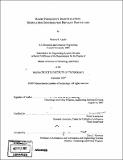Radio Frequency Identification : regulating information privacy protection
Author(s)
Laufer, Deanna (Deanna Raquel)
DownloadFull printable version (6.314Mb)
Alternative title
Regulating information privacy protection
Other Contributors
Massachusetts Institute of Technology. Technology and Policy Program.
Advisor
Robert Laubacher.
Terms of use
Metadata
Show full item recordAbstract
As applications of Radio Frequency Identification (RFID) become more profuse, the technology itself is stirring up some controversy. Due to its potential for amassing large amounts of information about both people and things, and the possibility of using the information for marketing, tracking, or even spying, numerous consumer groups are spearheading efforts to ensure that RFID does not breach their privacy rights. While there are some privacy laws regulating specific aspects of commerce, there are no laws which currently apply to the collection and use of information as it pertains to RFID. This lack of formal regulation allows companies to legally engage in practices which may encroach on consumers' privacy. However, RFID has the potential to optimize supply chain practices as well as provide other benefits to both consumers and businesses. As RFID use becomes more widespread, regulatory strategies should be considered to protect consumers' right to privacy while obtaining the benefits of using the technology. This thesis explores consumer and industry opinion of RFID through a customized survey. Results of the survey found that consumer and industry opinion are similar in many aspects, especially in the concern for protecting privacy and the desire for a regulatory mechanism to enforce those privacy rights. This thesis addresses the question of whether market-based solutions, self-regulation, or government regulation is the best option for addressing consumers' legitimate concerns of privacy while allowing businesses to reap the benefits of using the technology. (cont.) The regulatory options are compared and then discussed based on the needs of consumers and industry members as determined by the survey. Finally, four recommendations are suggested to provide guidance for ensuring a positive acceptance of RFID while acknowledging the privacy rights of consumers.
Description
Thesis (S.M.)--Massachusetts Institute of Technology, Engineering Systems Division, Technology and Policy Program, 2007. Includes bibliographical references (p. 82-87).
Date issued
2007Department
Massachusetts Institute of Technology. Engineering Systems Division; Technology and Policy ProgramPublisher
Massachusetts Institute of Technology
Keywords
Technology and Policy Program.